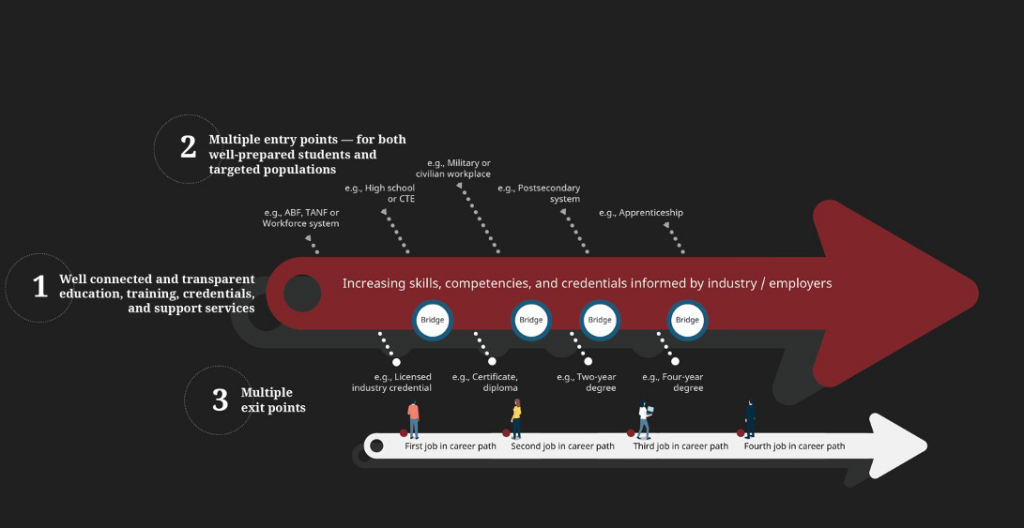Published on
Where It Starts: It Takes a Good Job to Build a Better Career

In January, CAEL and Truist Foundation announced the Where It Starts: Build Better Careers Initiative. Funded through the Truist Foundation for $15.7 million and executed by CAEL and other partners, the ambitious endeavor is in various stages of implementation in three regions: Charlotte, Memphis and Miami. By the time the six-year grant period concludes, Build Better Careers will have added two additional regions and anticipates connecting more than 6,000 adult learners to rewarding education-employment pathways in finance, insurance and adjacent industries.
Delivering these outcomes requires coordination with partners representing workforce developers, community-based organizations, industries and postsecondary education and training providers. But employer voices are what hold sway within the Build Better Careers engagement model, which hinges on industry validation of in-demand occupations. Identifying those high-demand positions is crucial to mapping career pathways that sustain equitable economic mobility by prioritizing traditionally underserved adult workers and learners.
Queuing Up Collaboration
In helping these populations advance within the finance and insurance sector, Build Better Careers is also seizing the opportunity to expand education, training and workforce development paradigms among organizations that only recently faced some of the recruiting and retention challenges that are endemic in much of the workforce. For this reason, the initial phases of the project have been devoted to engaging its diverse participants, helping them view peer organizations as partners rather than competitors. This change in perspective has helped participants recognize multilateral strategies to shore up talent pipelines as beneficial collaboration rather than zero-sum competition.
To maintain momentum among these peer organizations, each Build Better Careers region has local CAEL staff dedicated to keeping activities on track. To date, that work has been dominated by building out the roster of key partners needed to strengthen career pathways and initiating work to make them more accessible and navigable.
Education and training providers, for example, are undergoing CAEL’s Adult Learner 360. The diagnostic solution is informed by decades of research, including the new ALLIES Framework. Parallel surveys collect data from adult learners as well as postsecondary personnel to create a gap analysis and other assessments of the organizational effectiveness. These results will inform and individualize the technical assistance CAEL provides as it integrates education partners into Build Better Careers. CAEL is also cataloging certificate and degree programs among the education and training partners and mapping them to needs for career pathways programming as they are identified at each site.
The other half of the Build Better Careers ecosystem is, of course, the labor market. Supported by workforce boards and other intermediary partners, CAEL is positioning Build Better Careers as a hub where stackable education and training credentials can intersect with targeted occupations to form progressive career pathway programs in the finance and insurance sector.
Defining a Good Job
But what exactly makes an occupation worthy of targeting? As is evident in its name, Build Better Careers is not just about helping another industry solve a recruiting challenge. It’s about empowering new populations of adult learners and workers and upskilling and promoting incumbent workers with the career mobility that is only possible in the presence of good jobs. That definition may also seem self-evident, but jobs must meet several carefully chosen, region-specific variables to be deemed worthy of Build Better Careers.
Beginning with this end in mind, employer partners have been analyzing and validating regional labor market information. Lightcast™, a CAEL institutional member and Build Better Careers national partner, initially identified 25 top occupations for each region. It complemented this information with other data points including benefits and quality of work-life balance.
Employers at a recent Build Better Careers meeting in Charlotte then assessed these occupations to ensure they met the following conditions:
- In stable or growing demand
- A minimum number of current job openings
- Accessible without a bachelor’s degree
- A living wage—defined as the minimum earnings needed to support a worker and his/her family
Using these parameters, they identified eight occupations out of the 25 that could anchor Build Better Careers pathways. Such career pathways are foundational to Build Better Careers because they seamlessly integrate education, training, credentials and support services. With multiple on- and off-ramps, they meet adult learners and workers wherever they are along the continuum of educational attainment and career advancement. This format opens the door to education for many capable individuals who might otherwise be sidelined by a mistaken belief that they would not qualify for jobs in finance and insurance.

Because the occupations offer access to living wages via shorter-term training programs, they motivate trainees. At the same time, they build confidence about present and future talent pipelines among employers, as participants can progress to higher positions within the organization by gaining additional professional experience or continuing their education.
Regional Approaches
Because each region has a unique dynamic, flexible approaches and timelines are appropriate for each of them. For example, in Charlotte, the CLT Alliance is CAEL’s primary implementation partner. In Memphis, Workforce Mid-South is fulfilling that function, and OIC of South Florida will do so in Miami.
And while Build Better Careers is assembling a full complement of education and training providers, initial training will commence with BankWork$ at each site. The eight-week program is free to learners. In addition to training, it offers career coaching and placement assistance. In Charlotte, Goodwill Industries of the Southern Piedmont will provide BankWork$ training, with the University of Memphis performing the role in Memphis. In addition to serving as the primary implementation partner for Miami, OIC of South Florida will offer BankWork$ training for the Miami Build Better Careers region.
Participants acknowledge that there are natural challenges to bringing partners, some of which are competitors, together in one region. They credit Truist Foundation’s leadership and backing for drawing more employers to the table to discuss the broad benefits of equity-centered hiring. Meanwhile, CAEL’s participation has ensured the needs of adult learners and workers remain central.
Coordination will continue in Charlotte, Memphis and Miami ahead of the September launch of the first Build Better Careers training cohorts. CAEL expects to announce the final two Build Better Career implementations early next year, launching activities in the fourth region not long after. Collaboration in the fifth region will begin in 2025. A list of current Build Better Careers partners is available at cael.org.
Author Perspective: Association



